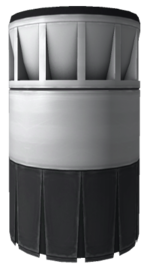J-X4 "Whiplash" Turbo Ramjet Engine
| J-X4 "Whiplash" Turbo Ramjet Engine | ||
| Jet engine by C7 Aerospace Division | ||
| Radial size | Small | |
| Cost | (total) | 2 250.00 |
| Mass | (total) | 1.800 t |
| Drag | 0.2 | |
| Max. Temp. | 2000 K | |
| Impact Tolerance | 7 m/s | |
| Research | | |
| Unlock cost | 18 000 | |
| Since version | 0.15 | |
| Part configuration | jetEngineTurbo.cfg | |
| Maximum thrust | 130.00 kN | |
| Isp | (max) | 4000 s |
| Fuel consumption | 0.66 | |
| Intake air consumption | 5.30 | |
| Thrust vectoring | 1 ° | |
| Electricity generated | 5.0 ⚡/s | |
| Testing Environments | ||
| On the surface | Yes | |
| In the ocean | Yes | |
| On the launchpad | Yes | |
| In the atmosphere | Yes | |
| Sub-orbital | Yes | |
| In an orbit | No | |
| On an escape | No | |
| Docked | No | |
| Test by staging | Yes | |
| Manually testable | Yes | |
The TurboJet Engine is an air-breathing engine which requires liquid fuel from fuel tanks and intake air. It is worth noting the intake air flows everywhere in whole craft so the placement of air intakes on the craft does not matter.
Usage
The TurboJet Engine can provide lots of thrust in high altitudes. At almost all altitudes it generates more thrust than the Basic Jet Engine, but it has a much lower specific impulse at most lower altitudes and is heavier by 0.2 tons.
It is extremely useful for SSTOs and demonstrated to be faster and more fuel efficient, partnered with Rockomax 48-7S rocket engines, than the hybrid aspirated rocket R.A.P.I.E.R. Engine.[1]. It is possible, however, that the R.A.P.I.E.R. engine is more efficient for vehicles with extremely high mass ratios, however, at that point, it makes more sense to go with a combination of 48-7S rockets and other, high-specific-impulse rockets for deep space.
Product description
| “ | A highly advanced turbine engine using space-grade materials for very high performance. This new model features the latest in thrust vectoring and compression technology. This engine is designed to operate best at higher altitudes and speeds, and engineers from C7 Aerospace assured us all those leaks stop once it gets up there. | ” |
Created by: C. Jenkins
Trivia
The internal part's name is turboFanEngine which is another kind of jet engine. In real life, a turbojet engine's fan pulls all the air from the intake through a combustion chamber, as opposed to a turbofan in which some of the air sucked in bypasses the chamber and is shot out of the back without being burned at all. The turbojet is more efficient at high speeds and in thinner atmospheres, although turbofans are much quieter and are very efficient when moving slowly. This is why turbofans are almost exclusively fitted on commercial airliners, and turbojets are more common on supersonic planes.
Changes
- Initial Release
References
- ↑ “KSP V.23 -Vid#65- SPACE RACE . No Mods.” by YouTuber vaos3712
